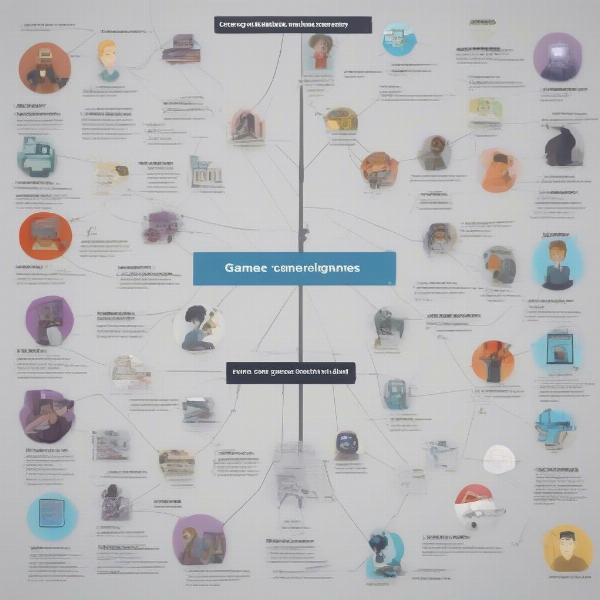The video game industry is a booming market filled with passionate creators and players. If you’re dreaming of joining the ranks and contributing to the next big hit, you’re in the right place. This guide breaks down How To Get Into The Video Game Industry, covering various roles, skills, and strategies for success. From programming to art, design to marketing, we’ll explore the diverse paths available and provide actionable steps to help you launch your career.
Landing your dream job in gaming requires more than just a love for games. It takes dedication, skill development, and a strategic approach. This guide on how to get into the video game industry will give you the insider knowledge you need to navigate this competitive landscape and pursue your passion.
Understanding the Video Game Landscape
Before diving into how to get into the video game industry, it’s crucial to understand its diverse roles. This industry isn’t just about game developers. Artists, designers, writers, producers, sound engineers, and marketers all play vital roles. Knowing your strengths and interests will help you choose the right path. Do you love crafting compelling narratives? Perhaps game writing is for you. Are you a coding whiz? Game development could be your calling.
Similarly, the competitive world of professional gaming is explored in how much does a professional gamer make. The insights provided there offer a valuable perspective on a different facet of the gaming industry.
Essential Skills for Breaking In
Regardless of your chosen field, certain skills are essential when considering how to get into the video game industry. Strong communication, problem-solving abilities, and a collaborative spirit are highly valued. Technical skills will depend on your specific role, ranging from programming languages like C++ and C# for developers to proficiency in design software like Maya or 3DS Max for artists.
Educational Pathways and Resources
While a degree isn’t always mandatory, formal education can provide a structured learning environment and industry connections. Game design, computer science, and fine arts degrees are common pathways. However, online courses, boot camps, and self-study are also valuable options for acquiring specific skills.
Building Your Portfolio
A strong portfolio is your ticket to showcasing your talents and landing a job in the video game industry. Start building your portfolio early, even if it’s just personal projects. Contribute to open-source projects, participate in game jams, and create your own indie games. A compelling portfolio demonstrates your skills and passion, making you stand out to potential employers. For some inspiration, check out how the choice of gaming hardware can impact your experience in our article: which game stick is best.
 Diverse Career Paths in the Video Game Industry
Diverse Career Paths in the Video Game Industry
Networking and Making Connections
Networking is vital in the gaming industry. Attend industry events, conferences, and online forums to connect with professionals. Building relationships and showcasing your enthusiasm can lead to mentorship opportunities and job openings. Don’t be afraid to reach out to people you admire and ask for advice.
Gaining Experience: Internships and Entry-Level Roles
Internships provide invaluable hands-on experience and a foot in the door. Many game studios offer internships for students and recent graduates. Entry-level roles, such as quality assurance tester, are another excellent way to gain experience and learn the ropes. Even seemingly small roles can provide valuable insights into the industry and help you climb the ladder. Ever wondered about different gaming experiences? Our article how low can you go game explores this concept further.
Crafting Your Resume and Cover Letter
Tailor your resume and cover letter to each specific job application, highlighting relevant skills and experience. Show your passion for gaming and demonstrate how your skills align with the company’s values and the specific role’s requirements.
 Successfully Landing a Job in the Video Game Industry
Successfully Landing a Job in the Video Game Industry
The Importance of Persistence and Passion
Breaking into the video game industry requires persistence. Rejections are part of the process, but don’t let them discourage you. Learn from your mistakes, refine your skills, and keep applying. Your passion for gaming will fuel your drive and ultimately help you succeed.
Mobile Game Development: A Growing Sector
The mobile game market is exploding, creating a wealth of opportunities for aspiring developers. If you’re interested in how to get into the video game industry through mobile development, focus on learning relevant programming languages like Java or Kotlin for Android and Swift or Objective-C for iOS.
This resonates with the idea of finding your niche in gaming, much like choosing the right gaming platform discussed in which game stick is best.
Indie Game Development: Forging Your Own Path
Indie game development offers creative freedom and the opportunity to bring your unique vision to life. While challenging, it can be a rewarding path for those with entrepreneurial spirit and a passion for innovation.
“The indie game scene is thriving. It’s a fantastic entry point for new talent,” says Alex Chen, Lead Designer at Imaginary Games Studios.
The Future of Gaming: VR/AR and Beyond
Virtual Reality (VR) and Augmented Reality (AR) are revolutionizing the gaming landscape, creating new opportunities for developers, designers, and artists. Staying ahead of emerging technologies will give you a competitive edge in this evolving industry. You can learn more about potential collaborations in the gaming world in our guide: how to be a big games partner.
 The Future of Gaming: VR and AR Technologies
The Future of Gaming: VR and AR Technologies
Conclusion
Getting into the video game industry requires dedication and a strategic approach. By understanding the different roles, building your skills, creating a compelling portfolio, and networking effectively, you can increase your chances of success. Remember, passion and persistence are key. Keep learning, keep creating, and never give up on your dream of contributing to the world of video games.
FAQ
-
What is the best degree for getting into the video game industry? There isn’t one “best” degree, but common choices include game design, computer science, and fine arts.
-
Do I need a degree to work in the video game industry? Not always, but a degree can provide a structured learning environment and valuable industry connections.
-
How important is a portfolio for getting a job in gaming? A strong portfolio is essential for showcasing your skills and passion to potential employers.
-
How can I gain experience in the video game industry? Internships, entry-level roles, and contributing to personal projects are great ways to gain experience.
-
What are some important skills for working in the video game industry? Strong communication, problem-solving abilities, collaboration, and technical skills relevant to your chosen role.
-
How can I network effectively in the gaming industry? Attend industry events, conferences, and online forums, and connect with professionals on platforms like LinkedIn.
-
What are some emerging trends in the video game industry? VR/AR, cloud gaming, and the metaverse are just a few exciting trends shaping the future of gaming. Do you enjoy gaming? Explore the idea further with our article: do you want to play the game.

